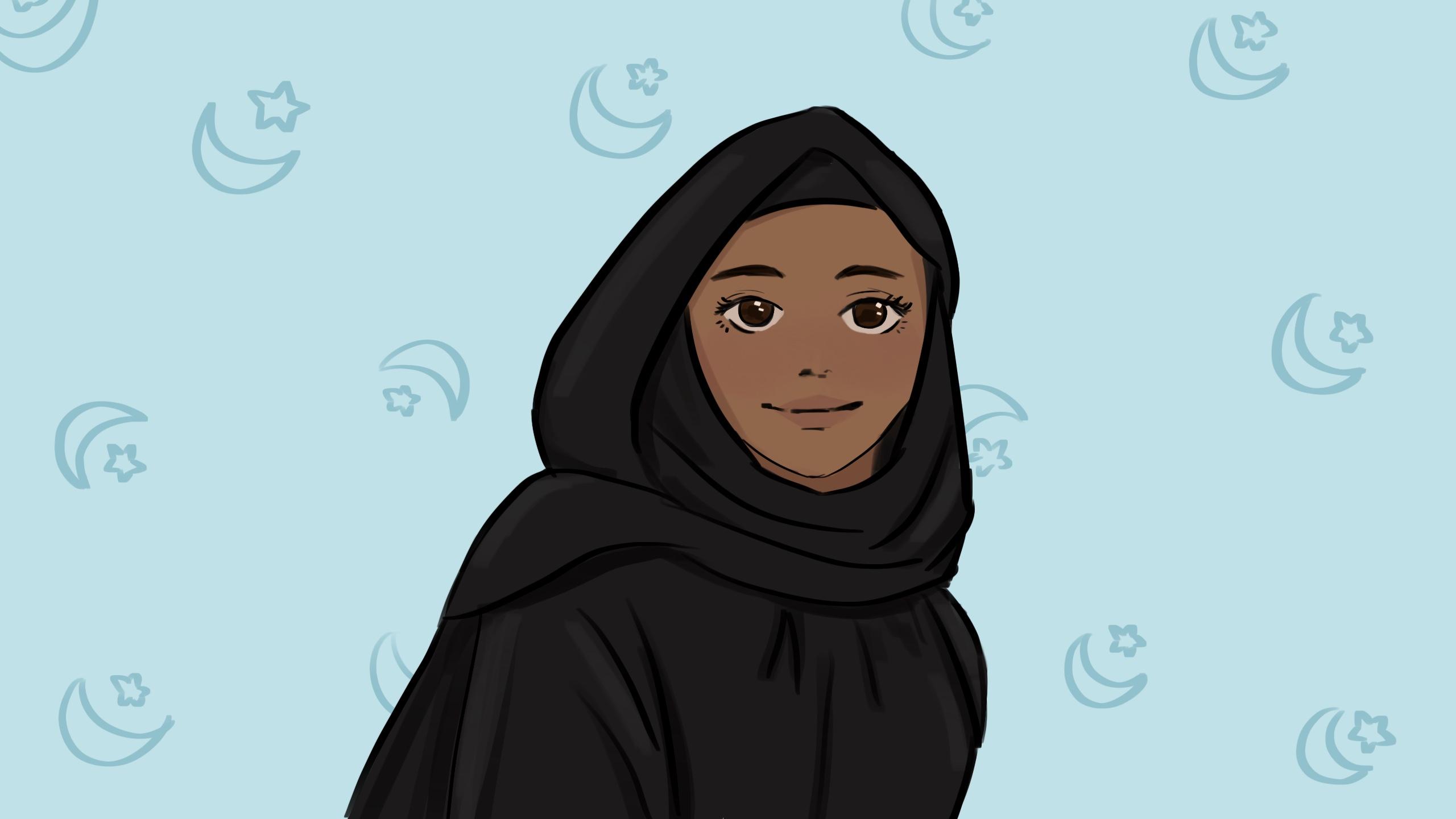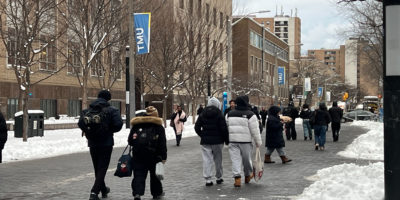By Samreen Maqsood
I walk past Balzac’s with my traditional black burqa—a full length thin coat used to cover one’s body—flowing lightly in the wind around me. I pull my hijab tighter around my head, keeping my eyes on the sidewalk while music blares through my AirPods. I can feel eyes following my every step.
Since the attack on a Muslim family in London, Ont. in June 2021, it feels like every set of eyes that stop on me are clouded with hate and judgement. It doesn’t help that I am an Ahmadi Muslim on a mainly Sunni Muslim campus.
Ahmadiyyat is a different sect of Islam, with an estimated 10 million Ahmadis living in more than 200 countries around the world. Approximately 85 per cent of the Muslim population around the world are Sunni, while 15 per cent are Shia. The only key difference between this sect and the others in Islam is the belief that the Messiah who will come to reform Islam has already arrived and passed away. Other sects believe he has yet to arrive.
While they follow the same teachings and scriptures as Sunni and Shia Muslims, Ahmadis are often the targets of serious backlash, especially in the media. Befriending Ahmadis online to lure them into murders is just one example. More recently, several TikTok videos have gone viral where non-Ahmadi Muslims make jokes about the founder of Ahmadiyyat, saying he “died on the toilet.” Ahmadis are often considered “kafirs,” which means “non-believers.”
As a Pakistani, I know first-hand that the consequences of identifying as an Ahmadi Muslim in Pakistan are nothing short of a death sentence. Under the second amendment of the Constitution in 1974, Pakistan passed a law forbidding Ahmadis from being called Muslim.
According to a Human Rights Watch report, in 1984, Ahmadis in Pakistan were not allowed to publicly practice their religion. Under the rule of the president of Pakistan at that time, General Muhammad Zia-ul-Haq, the anti-Ahmadiyya Ordinance XX was issued, an amendment to Pakistan’s Penal Code. Violations of the sections were punishable by death, imprisonment for life and liable to fines.
That does not begin to compare to the physical violence Ahmadis have endured over their history. According to Al Jazeera, at least 13 Ahmadis have been killed in targeted attacks in Pakistan since 2017 and more than 40 wounded. According to Human Rights Watch, in 2020 alone, at least five Ahmadis were targeted and killed by gunmen, with several others being wounded.
I have heard stories of my own extended family and community members back home who have been targets of hate crimes for years.
In Sindh, a southeastern province in Pakistan where my mom grew up for most of her life, there have been countless targeted attacks on Ahmadi Muslims. According to Global News, presidents and office bearers of the community have had their houses and farms burned, children have been charged for blasphemy and women subjected to harassment—all simply for being Ahmadi.
When my family goes back home for vacation, we need an overseas card to enter the country called a National Identity Card for Overseas Pakistanis (NICOP). When filling out a renewal application for my NICOP that expired last year, I had to declare that I, as an Ahmadi, was a non-Muslim.
“I profess that I am not a Muslim, and I belong to the Qadiani/Ahmadi religion,” were the exact words. If I didn’t sign off on it, I would not have gotten my card renewed and would not have been able to enter the country.
Many Ahmadi Muslims flee to Western countries, in hopes that they will be accepted despite their religion. While that may be the case, it does not exempt the feelings of loneliness and rejection I sometimes feel in an environment of mostly Sunni Muslims.
While they may not say it directly, I can feel the invisible barrier between people on the subway and myself; the conscious choice of never sitting beside the hijabi with her long, black burqa; the choice of always keeping a safe distance from me, social distancing rules or not.
I feel it when I walk through campus, where non-Ahmadi Muslims stare in curiosity at the burqa I always wear, another religious commandment that comes with being Ahmadi. I feel it when my classmates scoot their chairs further when the professor asks to get into groups and discuss the class content, leaving me looking around desperately to find a group.
I feel it when friends, classmates or co-workers ask why I wear a burqa all the time, making off-handed comments such as, “Wow, you must be an extremist Muslim,” “Your parents must really oppress you” or “You’re really trying to get into heaven quicker and faster.” Other comments, like, “You were forced to wear it,” or “I bet you wish you could wear crop tops and shorts instead” really hit the nail in the coffin.
In my first year of university, I made a Sunni Muslim friend in my politics class. We joked around about the professor being so uptight and shared other elective courses, getting comfortable with each other quite quickly. One day, while walking together to class, we were joking about the controversy between Pakistanis that were from Lahore and Karachi. There were a lot of memes that said these two cultures thought they were superior to one another. My friend asked which one I was, after telling me she was from Karachi.
I explained that I’m a mix of both: my mom’s side is from Karachi and my dad’s is from Lahore, so I always spend most of my time travelling between the two cities. She laughed, poking fun at me.
“Ew, no way would I have guessed you were both. I’m shocked that you and I get along. Well, as long as you’re not Ahmadi, I think we’ll be best friends for a long time.”
That sentence alone was enough to stop me halfway down the hall from our class. The full shock of her words didn’t hit me until after our class. While packing up my things, I had time to reflect on what she had said. I didn’t know how to respond, so I stayed quiet.
After that, I made an effort to stay away from her, deleting her phone number and socials and finding other people to sit with. My religion, no matter what sect I identify with, should not be the basis of my friendship with anyone.
Other Ahmadi Muslims on campus, like Fareeha Zafar, a fourth-year media production student, has gone through similar experiences of discrimination for being Ahmadi.
Zafar was president of the Ahmadiyya Muslim Students’ Association (AMSA) at Ryerson from 2019 to 2021. During an AMSA event at the Sheldon and Tracy Levy Student Learning Centre, she and some executive members from the group were sitting up at their station at the top of the bridge. According to Zafar, executives of the Muslim Students’ Association (MSA) stood in front of their table for the entire event, which lasted around five hours. Zafar said every time a Muslim student tried to come up to the ASMA table, MSA members would quickly divert their attention by talking to them about their own group and events.
“They played it off casually, making it seem like they weren’t doing anything wrong, but you could tell something wasn’t right. It sounds ridiculous and it was ridiculous,” said Zafar.
“I’ve noticed when any other Ahmadi person who has made it obvious they come from the Ahmadi community try to chat [with other Muslims]…people don’t respond too well, they don’t feel comfortable, even during our prayer sessions.”
My experience being an Ahmadi Muslim on campus hasn’t been all about exclusion and feelings of discomfort, though.
If I hadn’t spoken up about being Ahmadi on my university orientation day in 2019 during a discussion about joining the MSA, I would have never met my best friend, who is also an Ahmadi. I would’ve never gained the confidence to join the AMSA, where I met girls who had similar experiences and interests to me. Up until university, there weren’t a lot of Ahmadis near my age, so being around an entire group dedicated to educating non-Ahmadis about our religion and fostering a sense of belonging has been a heart-warming experience for me.
My only hope is that non-Ahmadis on campus don’t give different sects a reason to judge, reject or exclude Ahmadis on campus. In Islam, we are all equal, no matter our beliefs.












Jill Nouser
My heart aches reading about your experiences Samreen. This “attitude” from people, especially other Muslims, is beyond unacceptable and goes against the principles and teachings of Islam. No one has the right to judge anyone except Allah.
I admire your strength and truly respect you for sharing. May Allah protect you and give you strength.
Shifa Ahmed
I’m sorry you’re having to go through this, but I am glad you are responding to this adversity with strength. Shared trials make the best of friends, and- I know by experience- AMSAW is the best place to make those friends. I would have struggled in university without them. Stay strong, and pray much. Inshallah, just as the children of the people of Ta’if became Muslims after persecuting the Prophet (saw), so will those students who come to your university after these persecutors, or perhaps even the current bystanders who notice this ostracism. True Islam shines brightly, and Inshallah, may you be the reason that they are guided to it.
Wassalam,
an AMSAW alum from the University of Maryland Baltimore County
Tariq Malik
Ahmadiyya Muslim jamat is a Sunni jamat. To suggest that some how 85 percent Sunni Muslims are one entity is wrong . There are so many sects in Sunni Islam and they all call each other kafir. So why combine all opposing sunni sects and compare with ahmadiyya Muslim jamat? Ahmadiyya Muslim jamat is one of the larger, most dynamic jamaat’s with in sunni Islam
Raheelah
Hey Samreen, thank you for writing this article out. Amazing, inspiring and heartbreaking. Is there a way we can correspond privately?
Mariam
Salam Samreen,
I come from a Sunni family however recently did Ba’it. I see two different perspectives. I would love to connect with you. It is heartbreaking to hear this discrimination occurs. Though I understand the feeling of disconnecting with that individual educating her would have changed her mind. Many lack perspectives due to notions set by generational hate. Create a dialogue and use it as a tool for advocacy.
Mariam